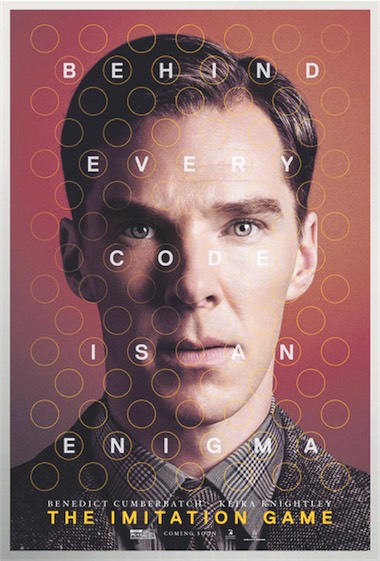
World War Two was the single most important (secular) event in history. It altered the face of the world forever, and its’ effects are still felt seventy years later. Perhaps that’s why Hollywood continues to churn out movies about the war, sometimes telling stories that are now only surfacing like The Monuments Men, Unbroken, The Railway Man, and now The Imitation Game, all true stories whose time has come. Each was a best-selling book before it hit the screen. Adding to the mix is the New York Times number one best seller Killing Patton. (I can vouch it’s a great read, I couldn’t put it down).
The Imitation Game tells a story suppressed by the British government for over 50 years after the end of the war. Anyone with even a casual interest in that history knows Winston Churchill was the heart and soul of the English people, their beacon of light in the dark. However, their greatest resource might have been a man who labored and died in anonymity. His name was Alan Turling, and almost single handedly he turned the tide of war in favor of the allies, saving over 14 million lives and by most estimates shortened the European theatre by two years.
The Imitation Game
Entertainment Rating: ★★★★
Rating: PG-13: No profanity, a few sexual references, no nudity, adult themed
Possible Oscar Nominations: Best Movie; Best Actor, Benedict Cumberbatch; Best Supporting Actress, Keira Knightly; Film Editing; Production Design
Turling was a mathematical prodigy and, by the tender age of 25, was being compared to Einstein by some in the academia. He was called into service by the government to help “crack” the Nazi codes that were easily intercepted but impossible to translate. The Germans had perfected a machine known as Enigma, which had 159 million, million, million options for each message transmitted, making it impossible for any group of tacticians to decipher the codes being used.
Turling knew that “man against machine” was an uneven playing field, and the problem would never be solved. No matter how many experts were recruited they simply were no match for Enigma. He had a vision, build a machine that would work faster than Enigma. The movie chronicles his battle to build it against all odds and against almost everyone in the secret group he was assigned to. Keira Knightly plays one of his assistants, Joan Clarke, and it is her incredible mind that helps him through one obstacle after another in pursuit of his dream.
Benedict Cumberbatch is superb in the lead role, one of the better performances I have seen in some time. The supporting cast, all outstanding in their own right, blend perfectly with Turling’s quirky personality, and eventually, they form a cohesive working unit, finally believing in his vision.
There are a number of twists and turns in the story, as Director Morten Tyldun moves us seamlessly between various periods in Alan Turling’s life; before during and after the war. The irony throughout is the man trying to defeat Enigma, is himself the very epitome of the word.
This is an outstanding piece of work and amazingly a story that should have surfaced decades ago, but for reasons only apparent after watching, was kept under wraps.
Questions or comments tsansom2002@gmail.com.




